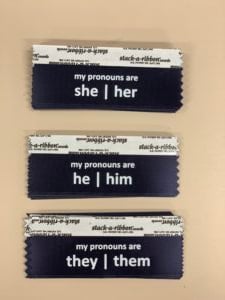 Bluebooking is hard. There are all these rules about how to refer to prior cases and different courts — the Bluebook itself even gets it wrong from time to time. Using pronouns isn’t hard. Anyone who’s had road rage and had to tell all of their friends “how that one asshole on Market St. couldn’t use a blinker to save their life” has used all the variations of they, them, and theirs to refer to one person. Not to mention, quite unlike the Bluebook, when you aren’t sure which pronouns to use for someone, they tend to just tell you outright! For whatever reason, calling a person their requested pronoun(s) is so difficult that Michigan had to be the first court to step in on the matter. From Reuters:
Bluebooking is hard. There are all these rules about how to refer to prior cases and different courts — the Bluebook itself even gets it wrong from time to time. Using pronouns isn’t hard. Anyone who’s had road rage and had to tell all of their friends “how that one asshole on Market St. couldn’t use a blinker to save their life” has used all the variations of they, them, and theirs to refer to one person. Not to mention, quite unlike the Bluebook, when you aren’t sure which pronouns to use for someone, they tend to just tell you outright! For whatever reason, calling a person their requested pronoun(s) is so difficult that Michigan had to be the first court to step in on the matter. From Reuters:
Michigan has become the first state to require judges to refer to attorneys by their preferred pronouns.
A divided Michigan Supreme Court on Wednesday approved a new rule that allows attorneys to include their preferred forms of address or pronouns in the captions of court documents and requires judges to use those terms “or other respectful means” when referring to those attorneys either in court or in documents. The rule, which was adopted 5-2 by the court, goes into effect Jan. 1.
“Our courts and court staff must conduct business in a way that is cognizant of changes in language and societal norms,” wrote Justice Elizabeth Welch in her concurring opinion, noting that judges no longer refer to women attorneys as either “Miss” or “Mrs.” in court depending on their marital status, as was the norm years ago.
You wouldn’t expect “call people what they tell you to call them” to have this much pushback. The criticisms of this policy are about as vapid as you would expect them to be:

Stand With Survivors: Legal Tools To Make A Real Difference This DVAM
Enhance your legal skills to advocate for survivors of intimate partner violence.
Michigan’s Supreme Court wants to force judges to use preferred pronouns for attorneys and litigants.
Can you imagine how confusing it will be?
The judge will say “They/Them is guilty” but it’s going to be only one person?
What about neopronouns?
“Frog is guilty”.
嵐 嵐 嵐
— Ada Lluch (@ada_lluch) March 11, 2023
Couple things here. Let’s start with the litigants:
1) No good faith person making this argument genuinely thinks a jury will be confused by the question “Do you think they did it?” If so, it isn’t a pronoun issue — the jury member just hasn’t been paying attention to the trial.

AI-Enabled Marketing: Your Secret Weapon for Growing Your Legal Practice
Drowning in marketing to-dos? Learn how firms use AI—the right way—to build lead magnets, rank in AI search, turn referrals into revenue, and craft data-driven business plans.
2) The party determined to be guilty generally isn’t the plaintiff — I don’t think it will be that confusing.
2) Judges could always just default to “Defendant Y” is guilty.
3) As far as neopronouns go, people are out here naming their kids Apple, LaKynn, and X Æ A-12. If somebody feels most comfortable going by Sock during sentencing, so be it.
It won’t be much harder referring to opposing counsel in gender-neutral terms. See, just did it in real time! Practically speaking, the rule lays out some simple pronoun examples:
[A]ttorneys may include Ms., Mr. or Mx., pronounced “mix.” As their preferred form of address in court documents. Mx. Is an honorific that does not indicate gender.
Attorneys may also indicate use of the pronouns he/him/his, she/her/hers, or they/them/theirs in captions.
This should be far easier to understand than other concepts people are expected to deal with in court like the Rule Against Perpetuities, the Felony Murder Rule, or how Clarence Thomas has had the nerve to be one of those pick-yourself-up-by-your-bootstraps types despite being bankrolled under the table for over 25 years.
‘History Is Made’ As Michigan Judges Are Ordered To Use Lawyers’ Preferred Pronouns [Reuters]
 Chris Williams became a social media manager and assistant editor for Above the Law in June 2021. Prior to joining the staff, he moonlighted as a minor Memelord™ in the Facebook group Law School Memes for Edgy T14s. He endured Missouri long enough to graduate from Washington University in St. Louis School of Law. He is a former boatbuilder who cannot swim, a published author on critical race theory, philosophy, and humor, and has a love for cycling that occasionally annoys his peers. You can reach him by email at [email protected] and by tweet at @WritesForRent.
Chris Williams became a social media manager and assistant editor for Above the Law in June 2021. Prior to joining the staff, he moonlighted as a minor Memelord™ in the Facebook group Law School Memes for Edgy T14s. He endured Missouri long enough to graduate from Washington University in St. Louis School of Law. He is a former boatbuilder who cannot swim, a published author on critical race theory, philosophy, and humor, and has a love for cycling that occasionally annoys his peers. You can reach him by email at [email protected] and by tweet at @WritesForRent.